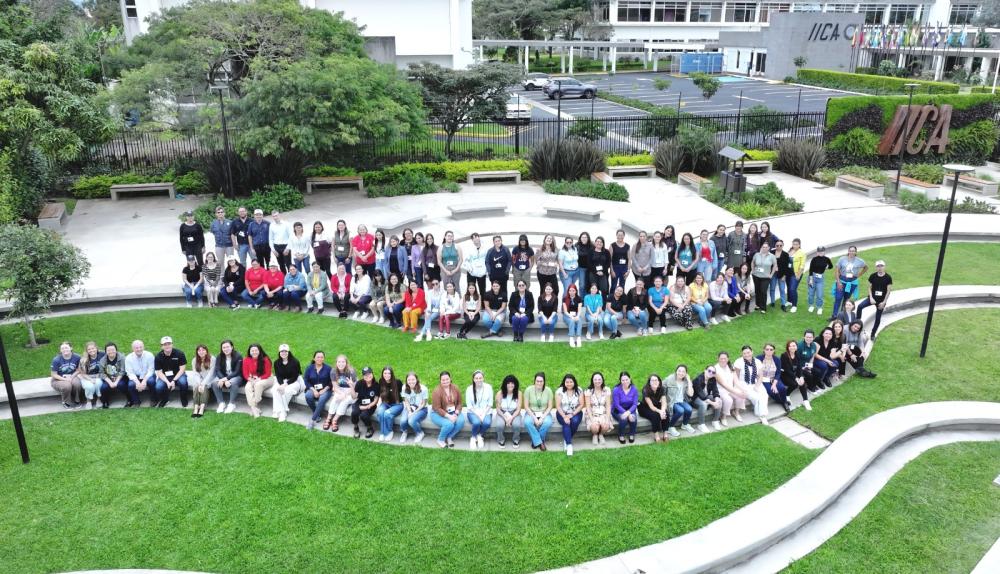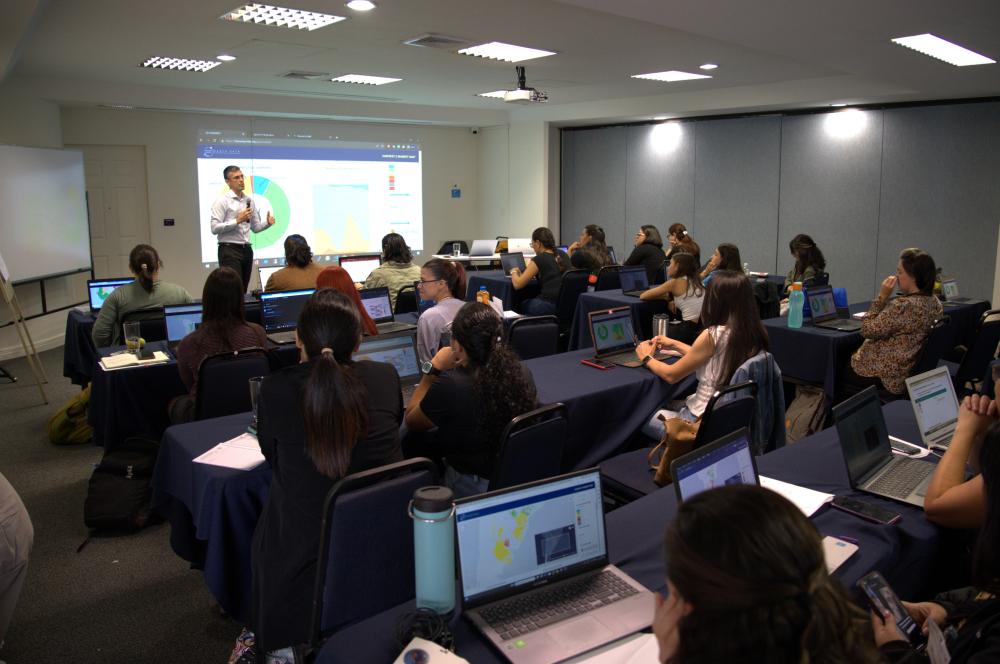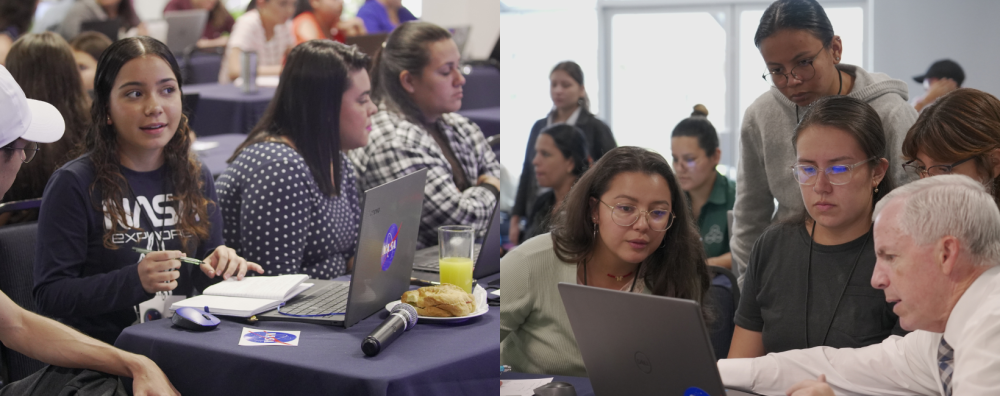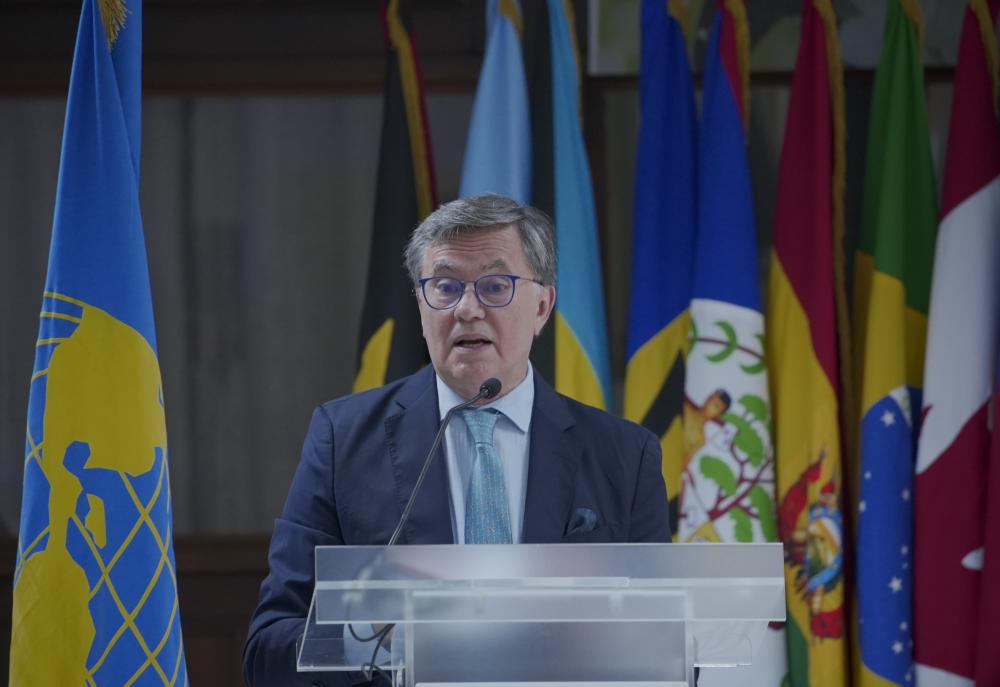Since 2019, the GeoFem: Women in Geospatial Technologies (Rally Femenino) workshops organized by IICA and its international partners have provided empowerment and training in innovation technology for more than 500 women. The most recent workshop was co-organized with SERVIR – a joint NASA and USAID initiative.

San Jose, 20 November 2023 (IICA)– More than 100 women involved in the agrifood sector and natural resource conservation in rural Costa Rica underwent training in the application of digital and geospatial technologies in agriculture and water resource management at a three-day event at the headquarters of the Inter-American Institute for Cooperation on Agriculture (IICA) in San Jose.
The training was an advanced edition of the GeoFem: Women in Geospatial Technologies workshop (Rally Femenino in Spanish), organized by IICA and partners such as RAC (the Central American Aerospace Network), SERVIR (a joint initiative of the National Aeronautics and Space Administration—NASA—and the United States Agency for International Development – USAID), NASA Harvest (NASA’s global agricultural and food security consortium), BYU (Brigham Young University in Utah), the BYU Ballard Center (a BYU program focusing on social impact), UNESCO (United Nations Educational, Scientific and Cultural Organization), GEOGLAM (a global agricultural monitoring initiative of the Group on Earth Observations) and GEOGloWS (an initiative to foster global water sustainability to support countries’ social, economic and environmental health, which, along with GEOGLAM, is regionally spearheaded by AmeriGEO).
The GeoFem workshops seek to bridge the digital divide between men and women, by building women’s technological, digital, geospatial and innovation capacities, enhancing their growth and resilience, and facilitating professional empowerment.
The participants were introduced to applications such as the GEOGloWS’ Streamflow Forecasting Service, a global hydrological model that generates forecasts that are updated on a daily basis, while providing access to a record of more than 40 years of historical flow data; and Climate Trends, which enables users to access and compare data from various global models to examine variables such as precipitation and soil moisture.
Participants also engaged in training on the application of tools for agricultural and food security monitoring and remote sensing. GEOGLAM, ClimateSERV and Google Earth Engine are just a few of the geospatial analysis platforms that participants explored, enabling them to gather satellite data and conduct advanced analysis to generate critical information for decision making in modern agriculture.

As an example of the applications that can be developed based on these technologies, five youth participants from the Edunámica Association presented a project prototype using Global Agriculture Monitoring (GLAM) System Analysis and Crop Monitor tools to assess the condition of wheat crops and to create production calendars to ensure the supply of the grain for local and export markets.
IICA invited women 14 years and over to attend the workshop, including members of professional associations, such as the Edunámica Association, Costa Rica’s Association of Agricultural Engineers, the Association of Geography Professionals and the National System of Conservation Areas of the country’s Ministry of the Environment and Energy (SINAC-MINAE). At the closing ceremony, participants presented projects that they developed using what they learned during the workshop .
The opening ceremony of the workshop featured speakers Betzy Hernández, Regional Science Coordination Lead for Central America at SERVIR’s Science Coordination Office; Paula Brenes, Representative of the Costa Rica National Commission for Cooperation with UNESCO; María José Molina, founder of the GeoFem (Rally Femenino) workshops and President of the Central American Aerospace Network (RAC); Luis Ramos, USAID Project Management Specialist; and Manuel Otero, Director General of IICA.
Betzy Hernández commented that, for SERVIR, it is extremely important to take part in events like these that focus on women as leaders who are positively addressing issues in agriculture, which are often driven by climate change.
“Forging partnerships with organizations such as the ones participating in this workshop expands the dissemination of knowledge and allows women working in the agrifood sector and in natural resource management to access these technological tools,” Hernández stated.
Luis Ramos, of USAID, acknowledged that we have a long road to travel to achieve gender equity, but stressed that the Development Agency is contributing by building capacities in science, technology, art and mathematics.

“The participants are gaining access to Earth observation technology applications and disaster risk management tools. In this workshop, participants gain exposure to knowledge from highly trained professionals”, he pointed out.
“We should bring this type of event to women in rural areas who for various reasons may not be able to access this type of education in spatial technologies. They, in their rural areas, can be part of the urgent solutions that the planet needs to face environmental changes”, said María José Molina, from the Central American Aerospace Network.
For Paula Brenes, from the Costa Rica National Commission for Cooperation with UNESCO, the workshop shows that the narrative regarding women’s access to technology is changing and many women are leading in development and innovation processes.
Finally, IICA Director General Manuel Otero stressed the fact that agriculture is undergoing a transition and a transformation and insisted that this was the opportune time to create the conditions that enable women to lead this process of change.
“We recognize the prevailing machismo of the agriculture sector, but IICA is working to change this reality and to create pathways for women to assume a leading role in development. The Forum of Female Ministers, Deputy Ministers and Senior Officials of the Americas is one of these efforts that is seeking to implement policies for gender equality and the empowerment of women”, he said.

More information:
Institutional Communication Division.
comunicacion.institucional@iica.int














